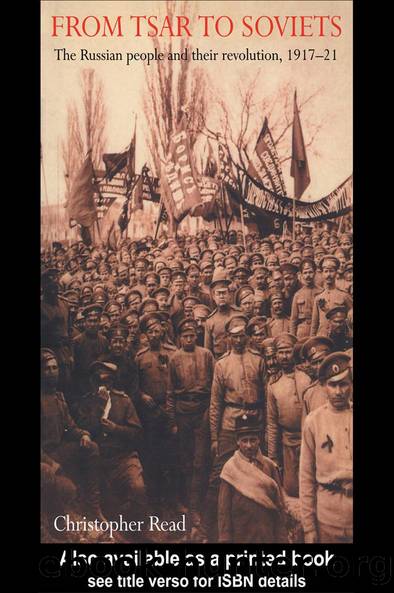From Tsar To Soviets by Christopher Reed

Author:Christopher Reed [Reed, Christopher]
Language: eng
Format: epub
Tags: History, General
ISBN: 9781135366261
Google: QQPFDwAAQBAJ
Publisher: Routledge
Published: 2005-11-10T15:52:24+00:00
Leninâs campaign for an insurrection
In early September Lenin, increasingly excited by the potential for revolution he sensed from scrutinizing the newspapers brought to him in his Finnish hideout, began, once again, to grasp the situation by the scruff of its neck. At first, he seemed to be toying with the prevailing liberal spirit. In early September he wrote an article suggesting that perhaps a peaceful Soviet takeover might be possible, a startling reversal of his insistence, since the July Days, that only armed uprising was on the cards. This dalliance, induced by the broad anti-Kornilov movement, was short-lived, and, perhaps, only intended for public consumption anyway. It was soon replaced by an urgent series of appeals to the Central Committee to implement the policy of armed uprising. The sequence of increasingly frustrated letters with which Lenin bombarded his colleagues is quite astonishing. At one point he offered to resign in order to take his fight to the membership. At other times he tried to bypass them, arguing that perhaps the revolution might begin in Moscow (where in fact the balance of forces was much less favourable to the Bolsheviks than in Petrograd) or, even more bizarrely, in Helsinki where a regional Congress of Soviets was due to be held. In his increasingly frenzied determination to launch an uprising both dimensions of Leninâs approachâquestions of immediate tactics to strengthen the necessary link with the masses and the larger theoretical underpinnings and aspirationsâ became inextricably intertwined.
The swings in Leninâs advice were unprecedented. The first communication, written on 30 August at the height of the Kornilov crisis, urged that the task of the left was not to take over but to put pressure on Kerensky to âarrest Miliukovâ, âarrest Rodziankoâ and adopt left policies on arming workers, transferring land and establishing workersâ control.25 The next, and equally un-Lenin-like contribution if only because of its title, âOn compromisesâ, urged that the Bolsheviks should agree to âa government of SRs and Mensheviksâ (who were now suitably redefined as âour nearest adversariesâ to distinguish them from âour direct and main class enemy the bourgeoisieâ) in which the Bolsheviks would make no claim to participate.26 In âThe tasks of the revolutionâ, written in the first half of September, the emphasis again was on âensur[ing] the peaceful development of the revolutionâ27 through transferring power to the soviets, a move that would be supported by such an overwhelming majority of the population that resistance would be impossible. At the same time as this article was written for publication, Lenin began to urge, in secret, something rather different, namely that âThe Bolsheviks, having obtained a majority in the Soviets of Workersâ and Soldiersâ Deputies of both capitals, can and must take state power into their own handsâ.28 Clearly Lenin was still driven by his hidden agenda. His colleagues, however, did nothing to act on his suggestion. This made Leninâs tone considerably more shrill in his next letters. To say that insurrection was un-Marxist was, he snapped, one of âthe most vicious and probably most widespread distortions of Marxismâ and âan opportunist lieâ.
Download
This site does not store any files on its server. We only index and link to content provided by other sites. Please contact the content providers to delete copyright contents if any and email us, we'll remove relevant links or contents immediately.
| Africa | Americas |
| Arctic & Antarctica | Asia |
| Australia & Oceania | Europe |
| Middle East | Russia |
| United States | World |
| Ancient Civilizations | Military |
| Historical Study & Educational Resources |
Red Famine: Stalin's War on Ukraine by Anne Applebaum(2467)
Chernobyl by Serhii Plokhy(2129)
Midnight in Chernobyl by Adam Higginbotham(2081)
The House of Government by Slezkine Yuri(1846)
Midnight in Chernobyl: The Untold Story of the World's Greatest Nuclear Disaster by Adam Higginbotham(1776)
Red Shambhala by Andrei Znamenski(1751)
The Gulag Archipelago (Vintage Classics) by Aleksandr Solzhenitsyn(1728)
From Cold War to Hot Peace by Michael McFaul(1713)
All the Kremlin's Men by Mikhail Zygar(1699)
Putin's Labyrinth(1660)
Red Notice by Bill Browder(1594)
The Future Is History by Masha Gessen(1591)
From Russia with Lunch by David Smiedt(1552)
A People's Tragedy by Orlando Figes(1544)
The Romanovs by Simon Sebag Montefiore(1489)
How to Tame a Fox (and Build a Dog): Visionary Scientists and a Siberian Tale of Jump-Started Evolution by Lee Alan Dugatkin & Lyudmila Trut(1469)
Putin's Labyrinth: Spies, Murder, and the Dark Heart of the New Russia(1456)
The Lost Spy by Andrew Meier(1398)
Art and Revolution by John Berger(1389)
